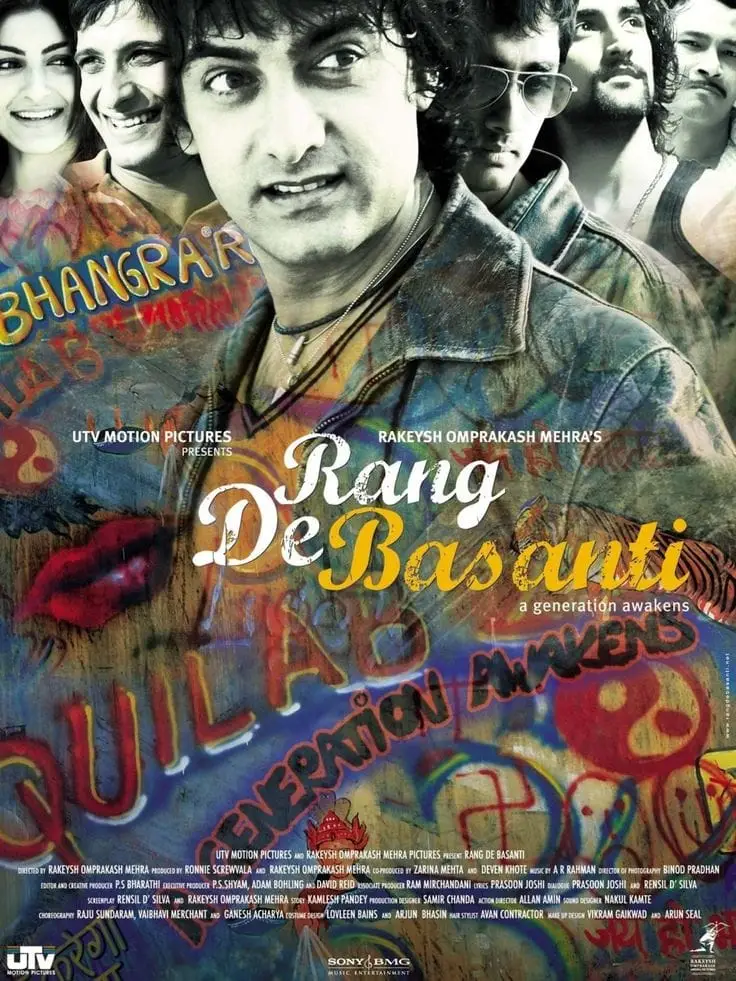Rang De Basanti (“Paint me with the colours of spring”)
An analysis of the unsung heroes – A feminist interpretation.
Directed by Rakeysh Omprakash Mehra
Produced by Ronnie Screwvala
Story and script: Kamlesh Pandey; Dialogue: Prasoon Joshi, Rensil D’Silva; Screenplay: Rensil D’Silva, Rakeysh Omprakash Mehra; Lyrics: Prasoon Joshi; Cinematography: Binod Pradhan; Music: A. R. Rahman
The silent sepian background running parallely to a high-spirited human emotion becomes a fair tool for a fine picturesque glorification of history. Cinema often offers us myriad replicas of what must have actually happened and we, the innocent ones happen to like it every time, perhaps because of the rigorous research involved. The rich parameters of caste, class, colour, sex and gender (rarely) then become the major point of interaction for the critiques and the intellectuals. The understanding of a certain utopian world finally presented on the screen takes a beautiful shape of a definite future in our minds and we become the obedient consumers.
Rang De Basanti, the film brings home the idea of vibrant patriotism which when consumed directly, settles somewhere inside the innocent heart. Far from the maddening crowd, the film becomes an epitome of human emotions. We cry and laugh at the same time, consuming what the common man feels is the need of the hour.
It surely resonates with the masses, regardless of their political inclination or age. The script draws two time frames- the young India today and the young Indian mind of the pre-independence era, seamlessly switching from one to another. Actually, everything falls in line for an ardent observer. Feminists, however will have a point to make.
Where should a revolutionary like Durgavati Devi, who is believed to have attempted to assassinate Lord Hailey at a time period when women were the passive labourers of the freedom struggle, be placed?
Where should a fearless fighter who literally ran a bomb factory at Qutub Road, be placed?
How should the pride of an entire clan of women fighters be justified?

According to the film, perhaps in the arms of an independent airforce officer. The men, on the other hand surely have tales to narrate. They lead, they fight, they argue and they plan. Planning which usually is out of the boundaries of a female mind. I refuse to accept this partiality. The film starts with a project, a project fairly led by a young woman who runs out of resources. However, she chooses the road not taken and visits the land of diversity. Fair enough! But, Isn’t this bag full of courage and commitments indirectly proportional to her grandfather’s emotional struggle?
Technically, this derivation becomes my concern. The momentary glimpses of a freedom fighter so strong as Durgabai Devi comes to me as an idea of deliberate carelessness. The identity so presented then becomes arguable. “No country is perfect, it needs to be made perfect” is Mehra’s message through the film. Here, a developing nation surrounded by corrupt politicians and lazy youth has been talked about. Surely, the number of unreported crime against women then and now remains unimportant in the film. What is a perfect country? One which idealises women leaders but leaves them unsung ? Once again, the power is in the hands of the powerful.
Interestingly, film critics even when discussing the movie in their reviews felt that RDB could lead to reflection, discussion and possibly even action among youngsters in India. It is for this reason that RDB enjoyed much publicity before and after release. It also helped that this film had an interesting ensemble of established actors and that the press declared the film to be one of the biggest releases of 2006. Nevertheless, the point I am trying to make is in reference with the secondary place given to the women in the film. What happens after the airforce officer Ajay dies? The frustrated youngsters surreptitiously shoot the defense minister and Ajay’s girlfriend(Soha Ali Khan), who once was a part of the rebellious gang suddenly experiences abundant sympathy. Why could she not do the same? How should this image be justified?
Ajay Rathod’s mother (played by Waheeda Rehman) represents a different class of women altogether. In contrast to Mitro (played by Kiron Kher), her perspective on the issues of family and settlement are fairly patriarchal. Her immense determination to counter the exploitation is justifiable and cannot be denied at all. However, she resigns her independent self and finally chooses to be a proud wife. Mitro, on the other hand is a fearless woman who presents a picture of selflessness and hardwork.
Unlike other female characters, she is given justice in the film. The politics of the film largely succumbs other perspectives but a feminist point of view will deal with all the parameters wisely. The four characters(Sue, Sonia, Mrs. Rathod and Mitro) bring home beautiful emotions and clearly show us the strength of their struggles. However, their desires remain unfulfilled throughout the film and leave people like me wanting for more. While the first plot of the film is unpredictable(because the audience knows nothing about the end), the second plot is familiar and closed. The death of the officer becomes the point of interaction of the two plots which also highlights the current socio-political scenario of the country. In between the two parallel plots are the heavy dialogues infringing the hearts of young people waking them up to the stark reality. Unfortunately, all of them are spoken by men while the women become the silent admirers of the speaker. Imagine if the case reverses. Will the popularity of the dialogue be the same ? The celebration of Rang De Basanti is vivid and deeply rooted in the culture of cinema and there is no harm in that but the argument of gender bias remains a childless question.

